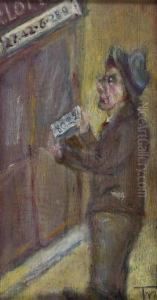C. Alberto Sallustri Trilussa Paintings
C. Alberto Sallustri, better known by his pseudonym Trilussa, was an Italian poet, writer, and sketch artist renowned for his satirical works and insightful commentary on both political and social issues of his time. Born on October 26, 1871, in Rome, Papal States, Trilussa's work is deeply rooted in the Romanesco dialect, reflecting the life, habits, and beliefs of the people of Rome. His pseudonym is an anagram of his surname, Sallustri, a playful move that hints at the wit and humor characteristic of his poetry.
Trilussa's early life was marked by financial hardship, which influenced his perspectives and literary themes. Despite these challenges, he showed a remarkable talent for poetry from a young age, publishing his first collection in 1887. Over his career, Trilussa became known for his ability to blend humor with sharp social criticism, addressing issues such as poverty, injustice, and hypocrisy. His style evolved from simple humorous sketches to more complex lyrical poems, often featuring animals to represent human vices and virtues, a technique reminiscent of medieval fables but imbued with a distinctly modern sensibility.
Throughout his career, Trilussa maintained a skeptical view of politics and politicians, often expressing disillusionment with the political landscape of Italy, which transitioned from the Kingdom of Italy to a Fascist regime and finally to a Republic during his lifetime. Despite this, he enjoyed widespread popularity among readers of all social classes and political affiliations, a testament to his skill in capturing the essence of the human condition and the specifics of Italian life and culture.
Trilussa never married, dedicating his life to his art. He was honored with numerous awards and distinctions, including an offer of a seat in the prestigious Accademia d'Italia, which he declined, staying true to his principles of independence and skepticism towards official honors. Trilussa died on December 21, 1950, in Rome, leaving behind a legacy that endures in Italian literature as a voice of the people, celebrated for his wit, humor, and keen social observation.
